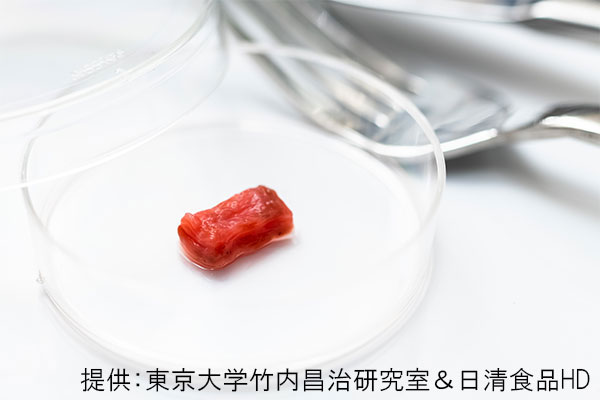Background
 Due to the explosive growth of population and the effects of climate changes, the gap between global food supply and demand is reported to become prominent by around 2030. The demand for meat in emerging economies in particular is estimated to increase considerably, and the supply is likely to fall behind. As one of the solutions to this problem, culturing of cells extracted from livestock animals to produce meat artificially (cultured meat) is attracting attention of those concerned about future food security, and R&D in this space is promoted worldwide. In Japan, JST-Mirai Program has started to fund the research related to the production of cultured meat in FY 2018, which was the first public funding in this area in Japan and one of the pioneering cases in the world.
Due to the explosive growth of population and the effects of climate changes, the gap between global food supply and demand is reported to become prominent by around 2030. The demand for meat in emerging economies in particular is estimated to increase considerably, and the supply is likely to fall behind. As one of the solutions to this problem, culturing of cells extracted from livestock animals to produce meat artificially (cultured meat) is attracting attention of those concerned about future food security, and R&D in this space is promoted worldwide. In Japan, JST-Mirai Program has started to fund the research related to the production of cultured meat in FY 2018, which was the first public funding in this area in Japan and one of the pioneering cases in the world.
Cultured meat is anticipated to bring about a radical food innovation, which has a significant impact on the environment, animal welfare, food hygiene, nutrition and the food culture. Meanwhile, as a novel entity, cultured meat entails various issues along with the technological development, including laws and regulations, safety and security, social acceptance, and ethics of food and agriculture, which need to be dealt with as society as a whole.
Current activities
In collaboration with the Prioritized Theme "Creation of innovative food production technologies in response to environmental changes in the future" of JST-Mirai Program ("Realization of a Sustainable Society" R&D area), we conduct a survey to grasp Japanese and global trends in research, technical development and industry related to cultured meat. We are also conducting research on laws and regulations, standardization, assessment of environmental impact, discussions of animal welfare/protection, safety and security of food and social acceptance of cultured meat, in order to elucidate ELSI in the historical and cultural contexts of food in Japanese society.
Our collaboration with JST-Mirai Program is a part of a more extensive collaborative network within JST, with experts in intellectual property, S&T communicators, and facilitators of co-creation with stakeholders. This enabled us to provide opportunities for dialogues and information provision not only for researchers but also for various stakeholders. For example, in 2019, we have held a citizen dialogue forum and an international symposium which were positively credited by participants from various sectors.
Future activities
Based on the outcomes of surveys, outreach activities and deliberation, we are preparing to provide evidence for the appropriate designing of R&D which takes ELSI/RRI of cultured meat into account. Also, we are committed to provide arenas to deliberate the vision of sustainable food system in the future, and how the novel production of meat may contribute to the realization of a preferable future, with researchers, the government, business sector, and people involved in the production, distribution and consumption of food, as well as the youth who are the citizens of the future generation.